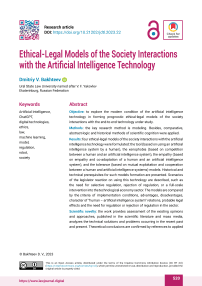Ethical-Legal Models of the Society Interactions with the Artificial Intelligence Technology
Автор: Bakhteev D. V.
Журнал: Journal of Digital Technologies and Law @lawjournal-digital
Статья в выпуске: 1 (2), 2023 года.
Бесплатный доступ
Objective: to explore the modern condition of the artificial intelligence technology in forming prognostic ethical-legal models of the society interactions with the end-to-end technology under study. Methods: the key research method is modeling. Besides, comparative, abstract-logic and historical methods of scientific cognition were applied. Results: four ethical-legal models of the society interactions with the artificial intelligence technology were formulated: the tool (based on using an artificial intelligence system by a human), the xenophobia (based on competition between a human and an artificial intelligence system), the empathy (based on empathy and co-adaptation of a human and an artificial intelligence system), and the tolerance (based on mutual exploitation and cooperation between a human and artificial intelligence systems) models. Historical and technical prerequisites for such models formation are presented. Scenarios of the legislator reaction on using this technology are described, such as the need for selective regulation, rejection of regulation, or a full-scale intervention into the technological economy sector. The models are compared by the criteria of implementation conditions, advantages, disadvantages, character of “human – artificial intelligence system” relations, probable legal effects and the need for regulation or rejection of regulation in the sector. Scientific novelty: the work provides assessment of the existing opinions and approaches, published in the scientific literature and mass media, analyzes the technical solutions and problems occurring in the recent past and present. Theoretical conclusions are confirmed by references to applied situations of public or legal significance. The work uses interdisciplinary approach, combining legal, ethical and technical constituents, which, in the author’s opinion, are criteria for any modern socio-humanitarian researches of the artificial intelligence technologies. Practical significance: the artificial intelligence phenomenon is associated with the fourth industrial revolution; hence, this digital technology must be researched in a multi-aspectual and interdisciplinary way. The approaches elaborated in the article can be used for further technical developments of intellectual systems, improvements of branch legislation (for example, civil and labor), and for forming and modifying ethical codes in the sphere of development, introduction and use of artificial intelligence systems in various situations.
Artificial Intelligence, ChatGPT, digital technologies, ethics, law, machine learning, model, regulation, robot, society
Короткий адрес: https://sciup.org/14127036
IDR: 14127036 | DOI: 10.21202/jdtl.2023.22


